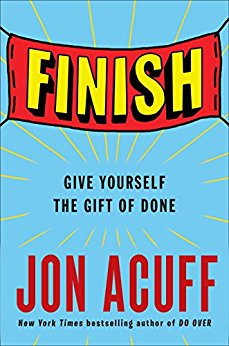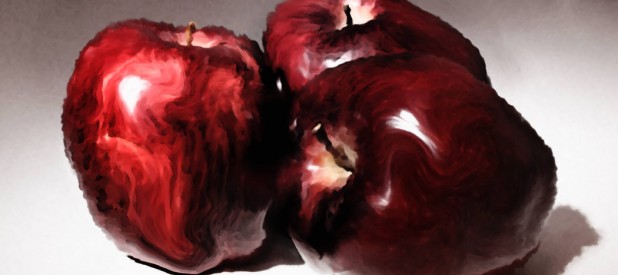 I’ve just finished reading Finish: Give Yourself the Gift of Done* by Jon Acuff. It’s a delightfully irreverent book packed with useful insights — sometimes counterintuitive — about how and why we stop ourselves from finishing (hint: perfectionism is the root cause).
I’ve just finished reading Finish: Give Yourself the Gift of Done* by Jon Acuff. It’s a delightfully irreverent book packed with useful insights — sometimes counterintuitive — about how and why we stop ourselves from finishing (hint: perfectionism is the root cause).
It’s been a particularly fun read right now for three reasons.
First, I’ve been reading it alongside several of my Circle members and we’ve been discussing it on our online site. I have a feeling we’ll be doing this again. It’s a mini online book club. Yay!
Second, I’m just about to lead the goal setting call for the Deep Dive Writing Intensive I’m running (we start writing next week!) so I’m looking forward to incorporating some of Acuff’s principles into our goal setting work. And since the Deep Dive Writing Intensive is designed to help people finish (or make major progress in that direction), it’s particularly apropos.
Third, I know I’m a recovering perfectionist. Or at least a perfectionist who’s trying to recover. (The first step is admitting you have a problem!) So this book was useful on both professional and personal fronts.
Here are some of my favorite takeaways from the book:
- The “day after perfect” is the make-or-break day. Acuff says the “day after perfect” often turns up as soon as day two of pursuing a goal. I see this happening with writers who put in a big burst of enthusiastic writing for their first day out (sometimes later), then crash and burn the next day by going into massive writing aversion and avoidance the next day… which can lead to despair and giving up. I much prefer to see writers pacing themselves for the long haul. Acuff makes the point that we have to focus on “moving forward imperfectly” and “trying again… today, tomorrow, or next week.” I’ve always been a fan of “starting over tomorrow,” whenever I get off track with my goals so I’m right there with him.
- There’s a difference between commitments and distractions. Acuff makes a useful distinction between the things we’re committed to doing, like our day jobs and our kids, as our commitments, and things like Netflix — and those side projects you turn to when it’s time to write — as distractions. See how simple that is? I found this useful for reinforcing what I do when I write out my Three Big Rocks list, which is to focus on the key things I want to accomplish for my goals that day. I don’t include my standing commitments (taking care of my kids and exercising, for example), because I think of them as “givens,” but prioritize the three major commitments I’m making for the day.
- You can look for your own sweet spot with rewards or penalties (or both) when it comes to goal setting. Acuff says, “make it fun if you want it done,” and recommends establishing a reward or a penalty for your goal. I’m more motivated by rewards than punishment, but his writing had me think more about deciding on really fun rewards, and deciding on them in advance. I’m particularly thinking about how I can do this on the daily and weekly scale (one example he gave was how author Sammy Rhoades would reward himself with a Friday afternoon movie for meeting his writing goals, which sounds right up my alley).
- Pay attention to where you “hide” from your goals. Acuff describes both “hiding places” — where we go to avoid our goals — and “noble obstacles” — the clever schemes we design to make it so we can’t possibly focus on our goals because we’re serving some higher purpose. I’ve seen so many writers over the years come up with the most fascinating and suddenly highly important non-writing or OTHER writing projects than they originally come into our programs with. This is really worth paying attention to and short-circuiting.
- Put your new idea at the finish line for your current one. If you tend to come up with a new idea that’s much more appealing than your current project the minute you start (in the coaching world, we call these Bright Shiny Objects), Acuff recommends making the new idea the project you “get to” work on when you finish your current one. With writing, I recommend what I call a “Project Queue” (tips on how to do this with writing projects are in my free guide, “How to Choose Your (Next) Book“). The core idea is to promise to work on the new idea next. In a sense it even becomes a reward for getting to the end of the current one. Yay!
- Aim a little lower with your goal setting. Acuff recommends cutting our goals in half, either by cutting the quantity or output in two, or by doubling the amount of time we give ourselves. This is because most of us are entirely unrealistic about how we set our goals. I’ve personally been setting fewer and fewer goals over the last few years, after seeing myself being unable to attain the multiple, too-fast-paced goals I was aiming for, and I can see right now from checking my 2018 goals list that I may have a bit more tweaking to do after reading Finish, especially after the hard start to the year I’ve had.
- The “day before done” is another place many of us go astray. I’ve witnessed this in my own writing, suddenly becoming apathetic toward a screenplay, telling myself I’ve just lost interest in the story. Acuff identifies three primary fears triggered by a looming finish, including a fear of what happens next (Amazon reviews!), a fear it won’t be perfect, and a fear of “what now?” The key, he says, is addressing these fears with a combination of trusting yourself to figure it out and being open to seeing what happens.
More my favorites in this book are the “secret rules” we use to sabotage ourselves (“If I lose all this weight, then I’ll have to go dancing/be looked at/feel more vulnerable”), choosing what to “bomb” (where you’re strategically choosing to suck at something in order to prioritize your goal), using data to track your goals and “celebrate your imperfect progress,” and many more.
While there were times I wasn’t 100% sure if I thought Acuff was actually writing about resistance and not so much about perfectionism (which I consider to be a subcategory of resistance), I loved what he shared and he has stirred some useful thinking and insight for all of us who have read it.
Highly recommended.



